STORIES FROM THE PHILADELPHIA ORCHESTRA ASSOCIATION RECORDS
In honor of National Library Week, I’m sharing a story of The Philadelphia Orchestra, a scholar from Argentina, and the Free Library of Philadelphia.
While processing the files of the Orchestra’s administrative staff, I came across a letter written in Spanish, addressed to the “Orquesta Sinfonica Filadelfia, U. S. A.,” which had made its way to the City of Brotherly Love from Buenos Aires, Argentina, in July of 1959, after a postal worker directed it to the Philadelphia Orchestra administrative offices, then located in the Girard Trust Building. It landed on the desk of Joseph H. Santarlasci, who served as the Orchestra’s assistant manager from 1955 to 1979, and manager from 1979 through 1985.
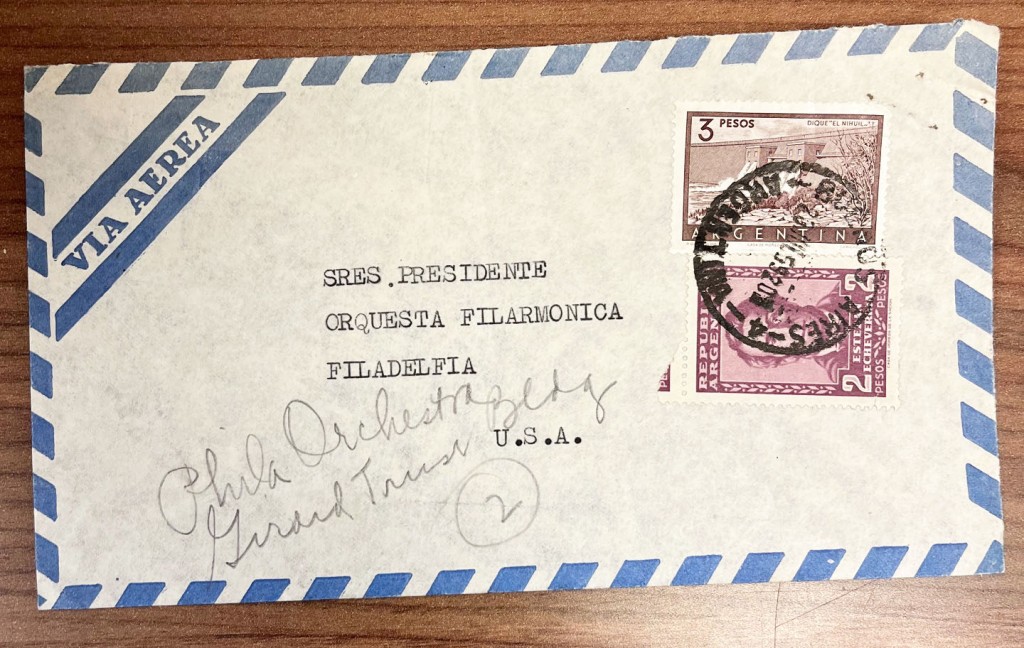
The letter’s author, Julio Santanera, was requesting information regarding the eminent composer Pyotr Tchaikovsky’s activities during his visit to Philadelphia in the 1890s. According to his letter, Santanera was planning to write a book about Tchaikovsky’s life and work. Someone at the Orchestra helpfully wrote some translations into the margins of the letter.
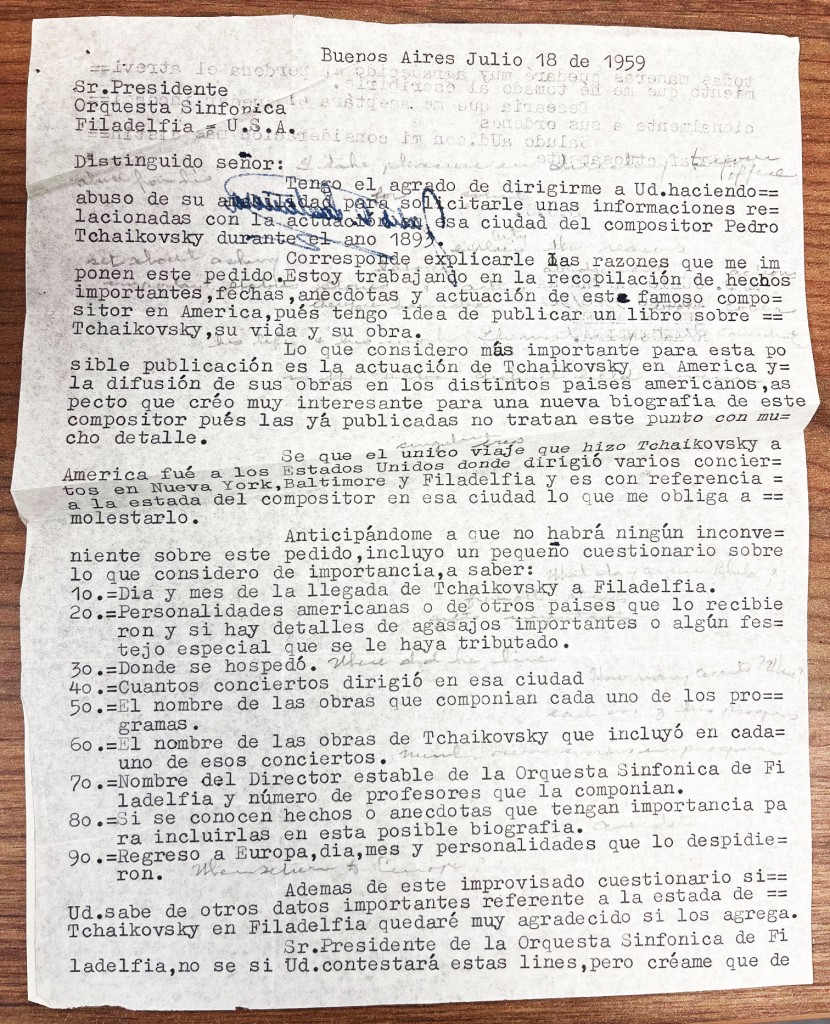
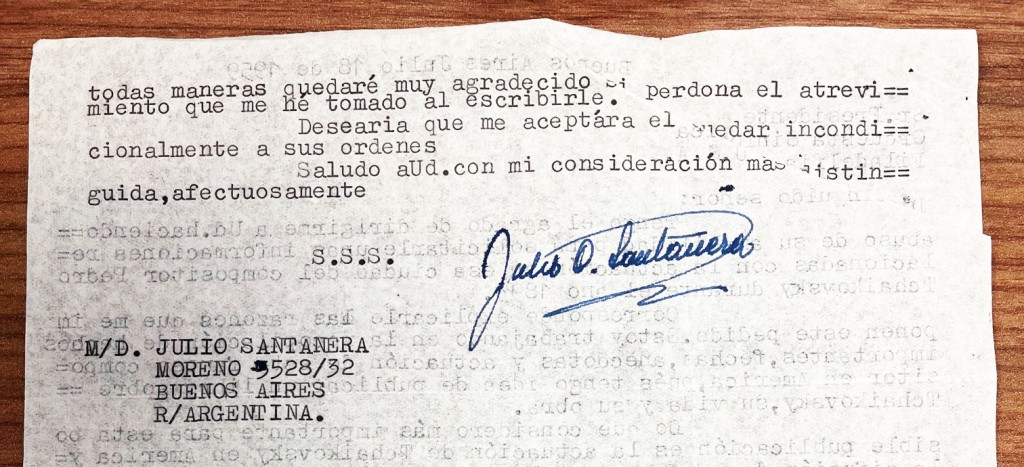
Given the fact that the Philadelphia Orchestra did not exist until 1900, it was perhaps not in the best position to answer these questions. So, Santarlasci had the letter translated and forwarded along to the best person to answer this long-distance reference request: a librarian! Specifically, Bernice B. Larrabee, Head of the Music Department at the Free Library of Philadelphia. In her letter, she lists and then answers his questions as thoroughly as possible. As any reputable librarian would do, she cites the sources consulted, which included notes from a 1940 Philadelphia Orchestra program. She mentions that three local newspapers, Robert Gerson’s 1940 book Music in Philadelphia, and even Tchaikovsky’s own diaries were of little help, but that Victor Herbert’s 1946 biography of Tchaikovsky was very informative.
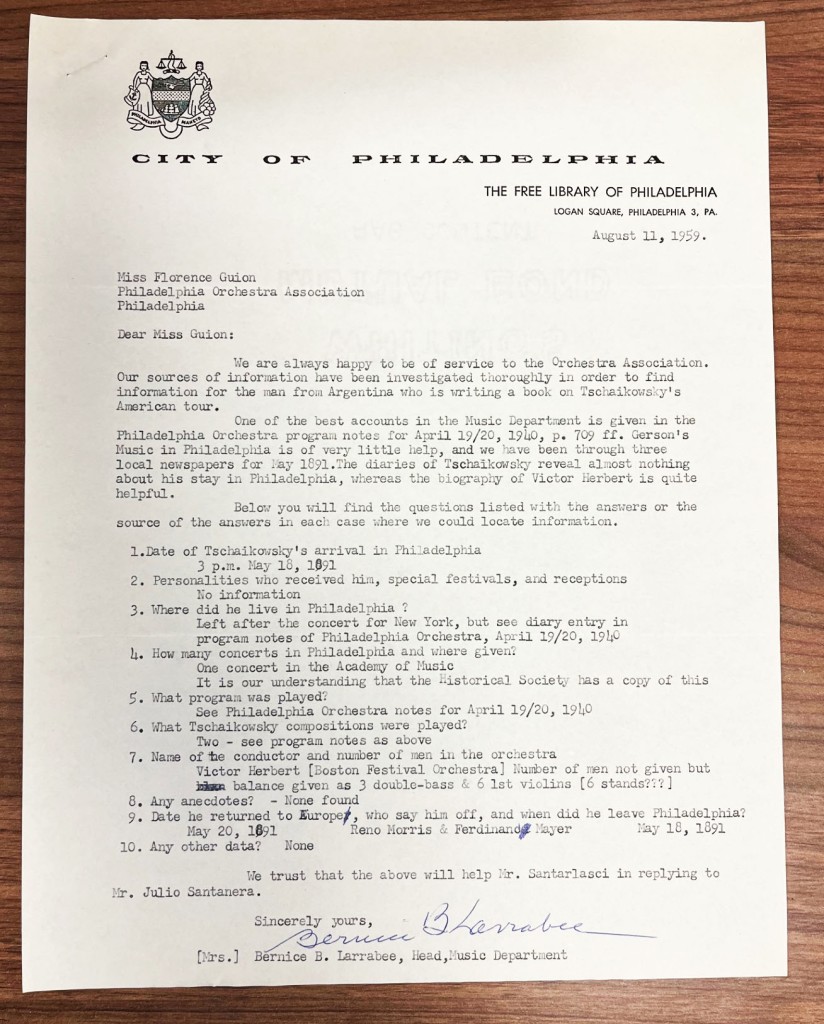
One of the key facts stated by Larrabee is that Tchaikovsky came to Philadelphia in 1891, not 1893, which was the year Santanera indicated in his letter. This was indeed an important detail to correct, especially since 1893 was the year Tchaikovsky died in Russia, at age 53.
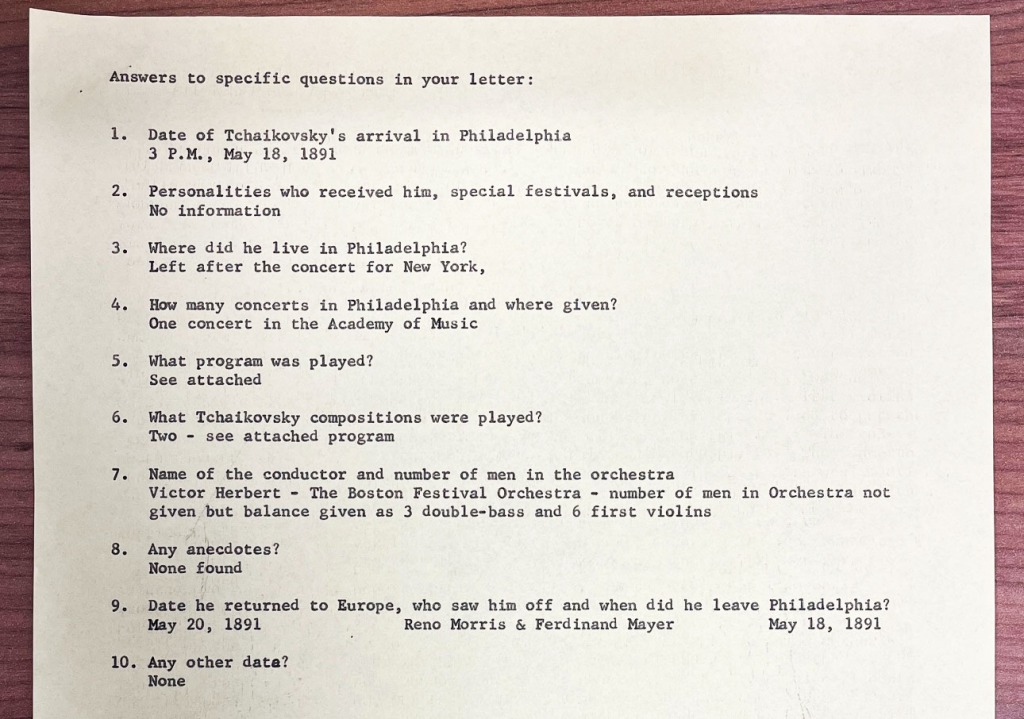
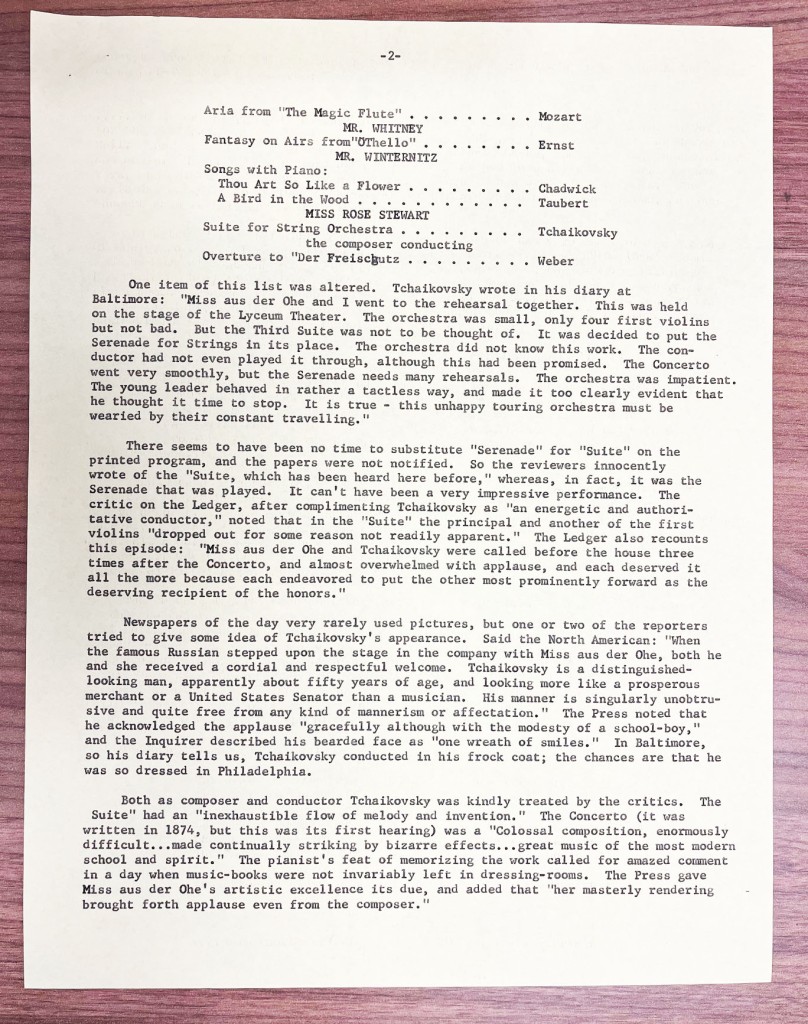
Larrabee relayed the information back to Santarlasci, who then sent it 5,200 plus miles back to Argentina.
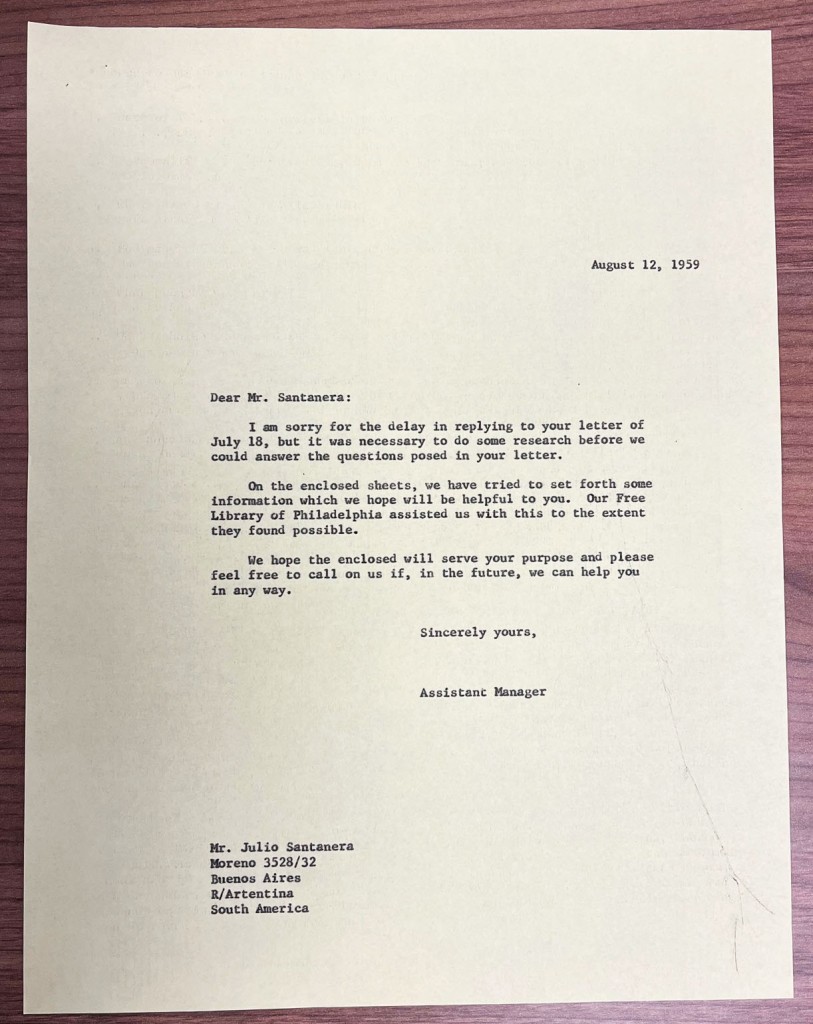
In case you, too, are interested in the fact that Tchaikovsky visited Philadelphia in 1891, here are some details outlined in Larrabee’s research:
Tchaikovsky attended one performance at the Academy of Music (which would, 9 years later, become the primary venue for the Philadelphia Orchestra). There he heard the Boston Festival Orchestra conducted by Victor Herbert.
He was in Philadelphia for one afternoon only: May 18, 1891, after which he returned to New York and then went back to Europe on the 20th.
Tchaikovsky conducted one work of his own, which was mistakenly printed in the programs and newspapers as the Suite for String Orchestra, when in fact the Serenade for Strings had been substituted and was performed. Tchaikovsky was perturbed this had not been rehearsed by the ensemble, and local reviews reflected the lack of preparation.
Because newspapers of the 1890s rarely published illustrations, reporters felt the need to paint a picture of Tchaikovsky for their readers. They described him as:
“a distinguished-looking man, apparently about fifty years of age, and looking more like a prosperous merchant or a United States Senator than a musician. His manner is singularly unobtrusive and quite free from any kind of mannerism or affectation.”
He acknowledged applause “gracefully although with the modestly of a school-boy.”
Tchaikovsky’s bearded face was “one wreath of smiles.”
Well before the Internet and its multitude of research databases, and reference librarians poised at their computers to answer reference inquiries via Ask-A-Librarian messaging and email services, the Free Library and the Orchestra worked together to make sure a letter full of questions from Argentina received a thoroughly researched response.
Today, the Music Department has evolved into the Free Library’s Edwin A. Fleisher Collection of Orchestral Music, which houses the world’s largest circulating collection of orchestra music, and lends sets of music to performance groups around the world. Staff there also produce their own blog posts focusing on its collections, activities and events.
And of course, the Free Library’s reference staff are there to help you with your research projects, whether or not they are related to music.
Happy National Library Week, and thank you to all of the librarians who continue to help us find what we are looking for!

